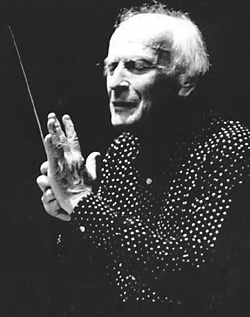Yehudi Menuhin - So much love for man, so little for us by Norman Lebrecht
/ April 1, 2000
Version française...
Famed as much for his warmth and altruism as for his musical gifts, in private Yehudi Menuhin found
emotions hard to express. The violinist's family speak for the first time about his formidable presence.

After Yehudi's death, his family is coming to grips with a man some felt they hardly knew. His widow, Diana, is ailing and the family are rallying to her bedside, sharing their sense of bewilderment at life after Menuhin.
"When he stopped playing the violin, that was almost a worse blow to me than when he died," reflects Jeremy, his youngest son. "People saw him as serene, but he was a very complicated man. He didn't have moods. He was either more distant or less distant. It was impossible to have an ordinary conversation with him, unless you were talking about one of his projects. The things that were furthest removed from personal feelings were all right. But anything personal was viewed as a weakness."
"He wanted things to work for him," says Zamira, his daughter forgivingly. "He had so many ideas that only he could pull off. He needed space, and he was lucky enough to have people in his life who gave it to him, people like me who adored him. Even if I was upset by personal matters, I understood. He would have hated to be thought of as anything but a warm man, but his warmth was for humanity more than for individuals."
Almost to his dying day, Menuhin nurtured fresh initiatives in human rights, arts education, nature conservation, and the bringing of music to those who needed it most. "He was driven by this deep sense of duty," says Yaltah. "So much so that when Hephzibah was dying of cancer in a hospital in Hanover, and he was conducting a concert in Hamburg, he could not stop over to visit his sister because he had a full diary the next day."
The propulsion stemmed from his prodigy childhood, manipulated by an overpowering mother who shadowed his life, living to the age of100. "She made Yehudi believe that she had given him his gift and she could take it away," recalls sister Yaltah. "He was so angelic. He learned, from dealing with her, to remove the sting from difficult people and make them do what he wanted."
Yehudi had opposed his son Jeremy's musical ambitions until they proved irresistible, whereupon he took him on tour to play piano-violin duets. "To play with him was very liberating," says Jeremy, who has never talked before of their relationship. "He thought a great deal about music. Playing the [Beethoven] Kreutzer Sonata for the 200th time, he took a lot of trouble. Sometimes what he asked me to do took days, even months, to achieve. I wanted to please him. He often said, 'You're the person with whom I like to play the most.' Once, in my early twenties, we played the first Bartók sonata at the Festival Hall and I felt something wild emanating from him, as if my youth had somehow freed the oppressed part of him."
Music was the place where Menuhin sublimated emotion. Family dynamics were funnelled through music. Hephzibah, his regular recital partner, visited his house only to rehearse, never to sit down to a family meal. One son from each of his marriages became estranged, and Yaltah clashed with Diana. Yehudi was generous with money but helpless in family affairs. When Zamira left her pianist husband, her father came round to remonstrate. "I was pretty upset," she says. "But my job was to go back, so I went back for four years."
"If he tried to intervene in our lives it was always clumsy," confirms Jeremy, "because it was done on a basis of theory. He had no practical knowledge of human relations. In my family, I was the one who was criticized for overemotionalism. I saw it as a euphemism for Jewishness, which had to be suppressed."
He never gave his children birthday presents — that was Diana's task. When Zamira once asked him what he was getting his wife for Valentine's Day, he first professed ignorance of the occasion, then rushed down Drummond Street and bought her half the contents of a Mayfair toiletries shop.
Diana was as formidable as his mother. He once confessed to Zamira that he didn't know how to please her. Diana told Jeremy, he recalls, "Your father feels he is a fraud as a violinist." Behind the elegant exterior, he was tormented by insecurity. Diana said he was like an iceberg, only one-tenth visible above water.
Yet his courage and determination overrode all inhibitions. He was always the first to raise his voice against injustice, to play for the underdog, and champion a holistic Utopianism. "He didn't mind being laughed at," says Zamira. "The most embarrassing thing he ever did to me - I was only 10 - was to appear on the front of Life magazine with his tongue hanging out to his navel, doing yoga. I didn't go to school for three days after that."
Towards the end, he voiced regret that "nothing he had done in his life had actually changed the world," and took trouble to visit Yaltah's dying husband, Joel. His family cling to these attentions as tokens of his love, a love that they were obliged to share with the rest of suffering mankind.
Zamira is now busy raising funds for his school. Jeremy will never play recitals with another violinist. Each clutches a part of Menuhin that was theirs alone. "As a boy," says Jeremy, "I used to hate going to his concerts, because the love that was meant for me was being disseminated to far too many people."
Norman Lebrecht writes a regular column on music in The Daily Telegraph and
Version française... | 

